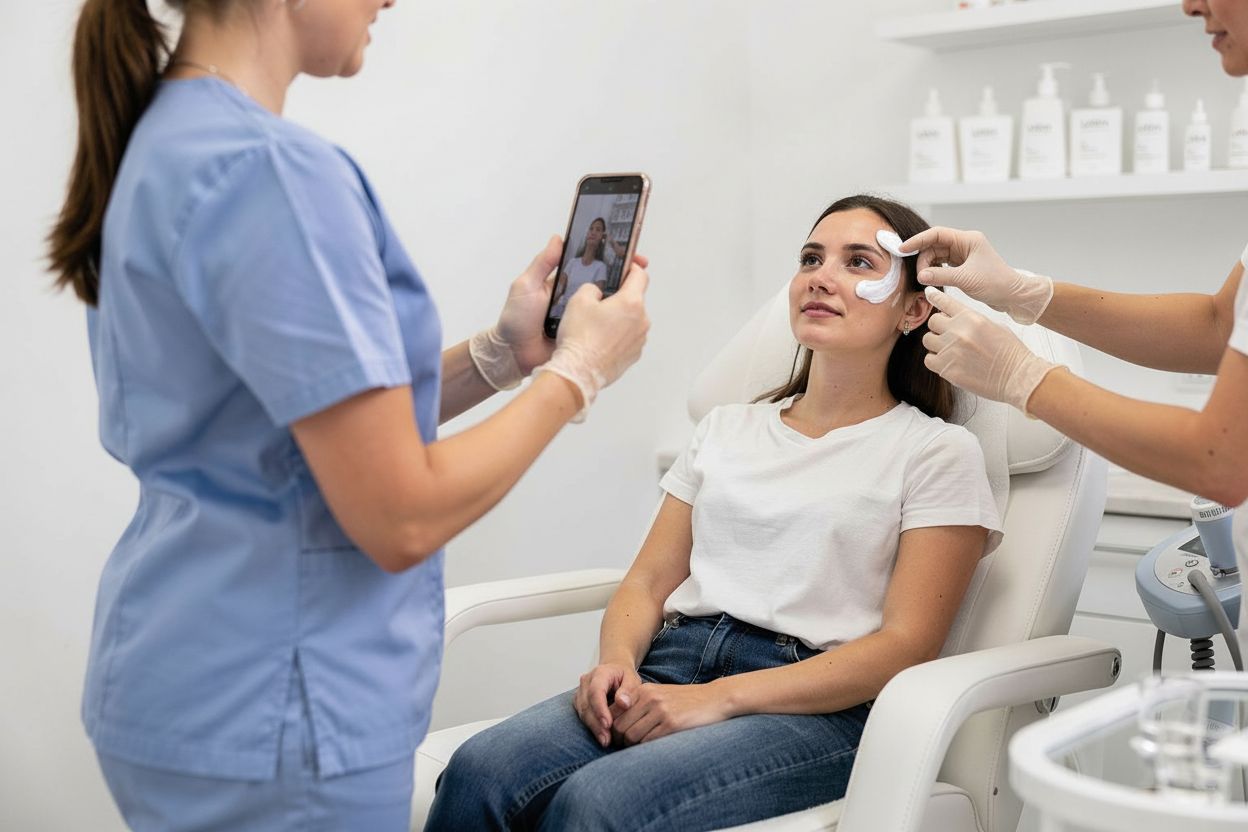Medical Spa Laws and Requirements in Colorado

Empowering Professionals at Every Stage
Portrait offers strategic expertise to help you make informed decisions and achieve long-term success.
Book Intro CallUnder Colorado law, a medical spa is a healthcare facility providing non-surgical aesthetic treatments that require oversight from licensed medical professionals. This guide will explain the state's specific ownership and operational rules to help you run a compliant and successful practice.
How Medical Spa Laws Work in Colorado
In Colorado, the key difference between a medical spa and a traditional day spa lies in the services provided. Medical spas offer procedures considered medical treatments, such as injections and laser therapies, which require clinical oversight. This distinction is fundamental to the specific medical spa laws in Colorado.
These distinct med spa regulations exist to protect patient safety. Because these facilities perform medical procedures, they are subject to rules like the Corporate Practice of Medicine doctrine, which ensures clinical decisions are made only by licensed professionals. Proper med spa compliance is therefore essential to operate legally and ethically.
Oversight for medical spas in Colorado primarily falls to two governing bodies: the Colorado Medical Board and the Board of Nursing. The Medical Board sets rules for physician delegation, while the Board of Nursing governs the scope of practice for nurse practitioners. These agencies establish the medical spa requirements Colorado clinics must follow.
Medical Spa Requirements in Colorado
Understanding who can open a med spa in Colorado begins with specific rules around ownership and professional licensing. Recent med spa regulations also introduce strict transparency requirements for spas in Colorado that delegate services to unlicensed staff. Meeting these medical spa requirements in Colorado is fundamental for your med spa compliance, and our platform is built to help you manage every detail.
Medical Spa Ownership & Business Structure Requirements in Colorado
Colorado's medical spa ownership laws are guided by the Corporate Practice of Medicine doctrine, which generally requires a licensed professional to own the practice. Physicians (MDs), physician assistants (PAs), and certain nurse practitioners (NPs) are permitted to own a medical spa. This framework is one of the core medical spa requirements Colorado enforces to maintain patient safety.
The rules for who can own a med spa in Colorado are nuanced for non-physicians; PAs can hold minority ownership under physician supervision, while NPs with full practice authority may own a practice independently. For non-licensed individuals, a Management Services Organization (MSO) model allows you to partner with a physician-owned practice to run the business side. This structure helps you manage operations while a licensed physician oversees all clinical care for spas in Colorado.
The required business structure for the clinical practice is typically a professional service corporation owned by the licensed provider. Critically, all med spas must have a designated medical director who is a licensed physician responsible for all medical procedures. Adhering to these med spa regulations is essential for your med spa compliance, and our platform helps you manage these details efficiently.
Facility, Licensing, and Compliance Requirements in Colorado
Operating a compliant practice in Colorado involves more than just the correct ownership structure. A core part of the medical spa requirements Colorado enforces is that all practitioners must be licensed, and a designated physician medical director must oversee all clinical services and protocols. Our platform helps you track these credentials to ensure your med spa compliance is always current.
As healthcare facilities, spas in Colorado are expected to follow standard safety and privacy protocols like OSHA and HIPAA, though specific state health department rules are not detailed in recent legislation. Securing adequate malpractice and general liability insurance is also a critical step for protecting your business. We can connect you with partners who specialize in insurance for the aesthetics industry to simplify this process.
Recent med spa regulations also introduced specific rules for advertising and recordkeeping to increase transparency. If you delegate services, your website and ads must disclose this and identify the supervising provider, a rule detailed in House Bill 1024. You must also display this information on-site and retain signed patient consent forms acknowledging this arrangement for at least seven years.
Who Can Perform Medical Spa Procedures in Colorado?
In Colorado, the authority to perform procedures like Botox injections, laser treatments, and IV therapy is tied to a professional's license and scope of practice. These services are generally considered medical procedures, which is why the medical spa laws in Colorado require oversight by licensed practitioners. Proper med spa compliance means ensuring every service is performed by a qualified individual, a process our platform helps you manage.
Licensed physicians (MDs) and physician assistants (PAs) under physician supervision can perform medical procedures. Nurse practitioners (NPs) with full practice authority may independently provide cosmetic treatments within their scope of practice, a key detail in the medical spa requirements Colorado outlines. The roles for RNs, aestheticians, and medical assistants are typically defined by what a supervising physician or APRN delegates to them.
While the state's med spa regulations allow physicians and APRNs to delegate tasks to trained staff, recent legislation focuses heavily on transparency. A new law requires spas in Colorado to clearly disclose when unlicensed individuals perform services under delegation. While this rule doesn't alter existing delegation or supervision protocols, which are governed by bodies like the Colorado Board of Medical Examiners, it underscores the importance of clear communication for patient safety.
Laser & Energy Device Regulations in Colorado
Colorado’s aesthetic laser laws are less prescriptive than in many other states, focusing more on physician oversight than device-specific rules. Procedures like laser hair removal are categorized as Level II medical treatments, which require an order from the medical director to be initiated. This framework places the responsibility for safe operation on the supervising physician rather than on detailed state statutes.
Under the current medical spa requirements Colorado enforces, only licensed physicians, supervised physician assistants, and nurse practitioners with full practice authority may perform these medical procedures. The state does not have explicit training or registration requirements for laser technicians, a regulatory gap that is not uncommon among med spa laws by state. Similarly, specific obligations for reporting adverse events from laser use are not clearly defined in Colorado's med spa regulations.
Medical Spa Enforcement, Penalties & Risk Management in Colorado
Violating the medical spa laws in Colorado can lead to serious consequences that jeopardize your practice, finances, and professional licenses. Enforcement actions range from cease-and-desist orders and heavy fines to disciplinary proceedings by the Colorado Medical Board or Board of Nursing, which can result in license suspension or revocation. Strong med spa compliance is your best defense against these risks.
Many violations stem from a few common, avoidable errors. The most frequent compliance missteps for spas in Colorado often include:
- Improper delegation of medical procedures to unqualified staff
- Advertising that fails to meet transparency requirements under new med spa regulations
- Operating with a business structure that violates rules governing who can own a med spa
- Poor documentation, including missing patient consent forms or expired staff credentials
Proactive risk management is the key to protecting your business. By establishing clear protocols and maintaining organized records, you can confidently demonstrate your commitment to patient safety and the medical spa requirements Colorado enforces. Here are some practical steps for staying compliant:
- Conduct regular internal audits of your procedures, documentation, and advertising to ensure you meet all state rules.
- Invest in continuous staff training on scope of practice, delegation protocols, and patient communication.
- Maintain meticulous records of everything from staff licenses and training certifications to signed patient consent forms.
- Partner with a platform built for the industry. Our system helps you track credentials, manage consent forms, and stay on top of complex med spa regulations.
Stay Compliant with Portrait Care in Colorado
Staying compliant in Colorado comes down to a few critical areas: structuring your business correctly under a licensed professional, appointing a qualified medical director, and confirming all procedures are performed or properly delegated by licensed practitioners. You must also adhere to new transparency laws for advertising and patient consent.
Please remember, this information is for educational purposes and should not be taken as legal advice; we strongly recommend consulting with a qualified healthcare attorney to address your specific circumstances.
Our platform gives you the tools to manage these requirements with confidence. Learn more about opening a compliant med spa or schedule a demo today to see how Portrait Care can support your growth from day one.
One Platform.
Everything You Need.
Everything You Need.
Portrait combines the technology, support, and savings to run and scale your modern medical wellness business.
Book Intro Call
Stay Connected with Portrait Care
Subscribe to our email list and receive the latest insights, updates, and exclusive content delivered straight to your inbox.




![Who Can Own a Medical Spa? [State by State Guide]](https://cdn.prod.website-files.com/67981e0672f9e49c5b9cb890/69869b11472946b6ec9fe1f0_1770427418079.jpeg)
